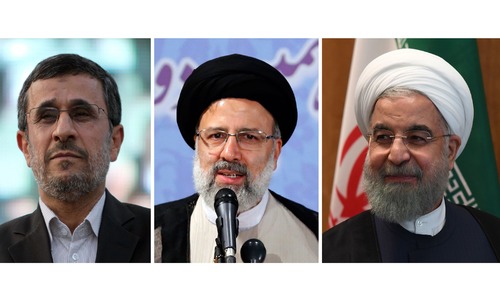TEHRAN: Tehran police have arrested 29 women for appearing in public without a headscarf as protests against the dress code in force since the Islamic revolution of 1979 intensify, Iranian media reported on Friday.
Those arrested were accused of public order offences and referred to the state prosecutor’s office, the Fars, ILNA and Tasnim news agencies reported without elaborating.
Chief prosecutor Mohammad Jafar Montazeri had played down the escalating protests on Wednesday, saying they were “trivial” and “childish” moves possibly incited by foreigners.
He had been asked about a woman detained earlier this week for standing on a pillar box in a busy street waving her headscarf on the end of a stick. Unprecedented images of at least 11 women protesting the same way had been widely shared on social media.
A prominent human rights lawyer said that one of the detained women had her bail set at more than $100,000.
Montazeri said those flouting “hijab” rules — which require headscarves and modest clothing — must have been encouraged by outsiders.
But even religiously conservative Iranians have voiced support for the protests, with many saying that religious rules should be a personal choice.
At least two photos shared on Twitter on Wednesday showed women in traditional black chador robes, standing on pillar box with signs supporting freedom of choice for women.
One held a sign reading: “I love my hijab but I’m against compulsory hijab.” Female activist Azar Mansouri, a member of the reformist Union of Islamic Iranian People party, said attempts to control female clothing had failed over many decades.
“Women show their opposition to such forceful approaches by their very clothing, from resisting covering their hair to wearing long boots and leggings,” she wrote in a series of tweets this week.
Morality police once rigidly enforced the rules, but are a much less common sight since President Hassan Rouhani came to power in 2013, promising greater civil liberties.
The protests appear to mirror that of a woman who stood in Tehran’s busy Enquilab (Revolution) Street in December without a headscarf and waving a white scarf on a stick.
She was reportedly kept in detention for nearly a month and has since kept a low profile.
Reformist lawmaker Soheila Jelodarzadeh said the protests were a reaction to the harsh policies of the past.
“Once upon a time we imposed restriction on women and put them under unnecessary pressure and that provoked these protests with women taking off their headscarves in the streets,” she told ILNA. “It’s the result of our mistakes.”
The deputy speaker of parliament Ali Motahari, who has been an outspoken critic of the authorities on other issues, including the house arrest of opposition leaders, played down the significance of the protests.
“There is no coercion as far as the headscarf is concerned and many women go out in the streets dressed how they want,” he told the ISNA news agency.
“The fact that a handful of women are waving their headscarves in the air is not a big event. The country’s problem is not the headscarf and women respect it more or less. We don’t want to make a show of severity.”
Published in Dawn, February 3rd, 2018














































